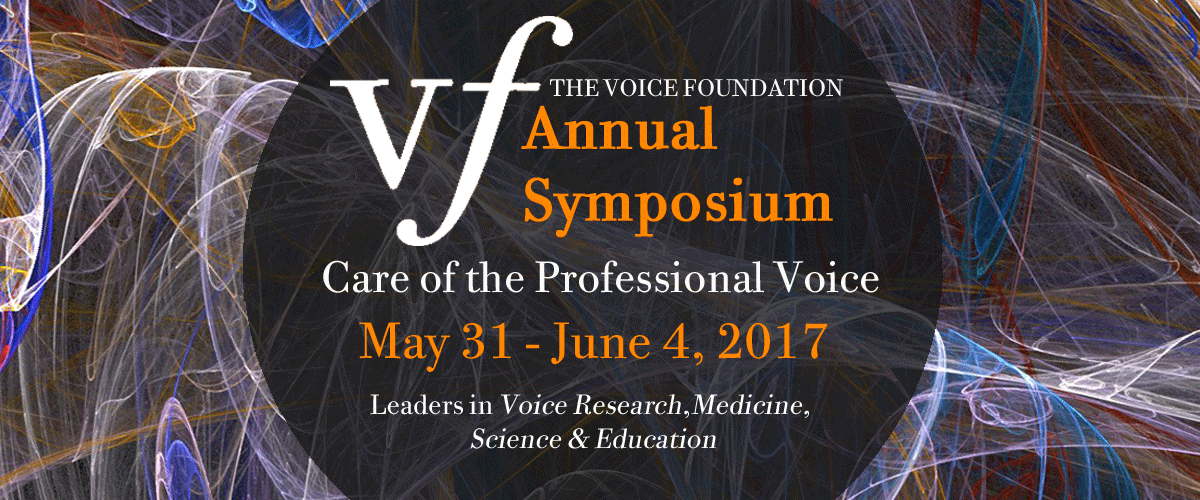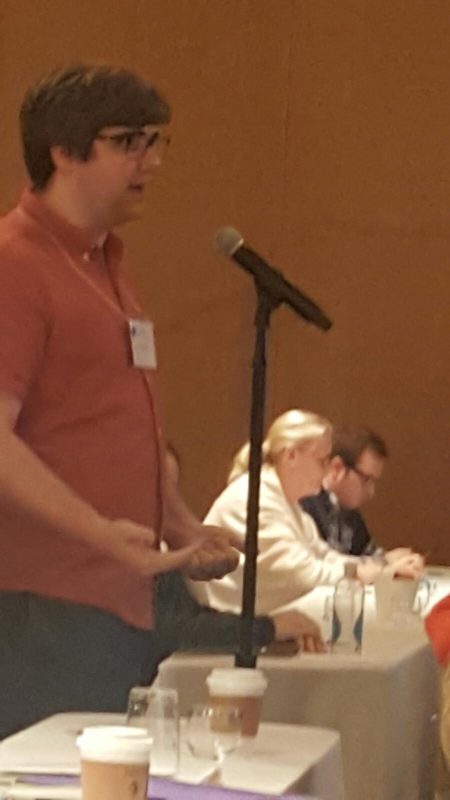Recap: The Voice Foundation 2017 Symposium

06/12/17 UPDATE:
I was able to gain the perspective of one of the presenters in the afternoon. With their permission, I will share a section of their statement:
"...I completely agree that we missed a really important moment there and I'm sorry. I will confess, before the opening day I was feeling confident about our workshop and had clear intentions. After the morning sessions, I felt like I had been hit by a bus--like we had all collectively been hit by a bus. I had to sit in a quiet place and try to sort out what had just happened, and rethink my section of the presentation because the audience I was hoping to speak to was so clearly not this audience. I honestly didn't feel safe introducing myself with my pronouns... [and] if it wasn't safe for ME, how could it be safe for my friends?"
I thank this presenter for sharing their perspective with us, for feeling unsafe in spaces centered around our experiences is a grave concern and is very difficult for many to talk about openly. And this presenter is not alone, as their feelings of insecurity have been echoed in multiple other transgender audience members we have spoken to since the event.
If The Voice Foundation and other similar organizations wish to truly serve the transgender population in the future, the security and safety of trans attendants must be prioritized. If they feel unsafe because of actions of the presenters, the quality of information presented becomes very suspect of holding prejudice and transphobia. If the medical community ever wishes to gain the trust of the transgender population, they must work to improve their own cultural competency, particularly when they think no (or few) trans ears are present. It is not enough to treat a client with respect when they are present; true, authentic respect for the culture must be achieved.
***
This past weekend, I was fortunate enough to be able to attend The Voice Foundation's 46th Annual Symposium. Every year, voice professionals from across multiple disciplines come together to hear about the latest in voice-related research, intervention and teaching techniques. This year, there was an entire day of resources dedicated to transgender voice! It was an incredibly enriching experience to attend: I learned a great deal from the top endocrinologists, surgeons, speech-language pathologists, and vocal performance specialists; I reconnected with several old friends in my field; and made many new friends and connections! I was also able to purchase several resources for my practice that will be incredibly useful in the future.
During many of the sessions, presenters emphasized how important it is to be culturally competent when working with the transgender population. This was good to see, particularly when the history of transgender medical intervention is steeped in discriminatory language and practice. In the spirit of pursuing cultural competency, there are several issues that must be raised with this year's Symposium. As always, there were multiple moments of clumsy misusage of terminology or usage of outdated problematic terms such as "natal female" or "biological male" by members of the audience as well as the experts they'd invited to present. Additionally, none of the presenters introduced themselves with their pronouns. This lack of awareness of preferred terminology is frustrating to me, particularly if these individuals are considered experts of working with trans people in their field. Another element I would like to address is the lack of diversity in the presenters. Almost all of the presenters were white and cisgender, which was disappointing to see. The moderator of the panel lamented the fact that, despite their efforts, there was a lack of transgender voices on that panel. My trans and non-binary speech-language pathologist friends glanced at each other in confusion; we certainly hadn't been reached out to, nor had several of the other trans practitioners in the audience.
Even among the heads of their fields, the need for transgender cultural competency training is clear. The presenters were certainly well-intentioned, but that alone is not enough. I approached the panel during their Q & A and asked the question that I felt most people needed to be answered:
Kevin: How can clinicians and researchers respectfully engage with the transgender community without invading safe spaces, such as support groups? What are effective methods you've had success with?
Unfortunately, the response I received was rather vague. The panel of six was silent until one woman spoke that she was usually invited to support group meetings and that generally made it more acceptable for her to attend. Which I can see; if the support group is okay with one visiting, then visiting the group is acceptable. However, this did not really answer my question, and we ran out of time to discuss further. I hope the panelists have engaged with transgender culture more than could be discussed at that time. Seeing as none of the panelists were transgender, and the many cultural blunders that were exhibited, it's given me more drive to complete cultural competency training courses for practitioners who want to learn more.
With all the above problems, the Symposium was still very informative, and a great success! In the afternoon, the Symposium arranged a fantastic demonstration by four members of ResonaTe, an all-transgender choir in Chicago which eschews conventional Western choral traditions in favor of a more flexible structure. The five representatives of ResonaTe who were presenting explained that traditional choirs' usage of very gendered language such as soprano, alto, tenor, bass, etc, do not allow much wiggle room, both in terms of the gender makeup of the parts and in terms of very limited acceptable presentation. The ideal soprano is a very specific type of woman with a very specific sound. Instead, ResonaTe uses a numeric system to identify different vocal parts, and members of the choir learn every vocal part. Then, they are free to choose voice parts for themselves and are free to change voice parts as meetings go on. This self-selection also removes some of the authoritarian power of the conductor, who typically assigns members to their voice parts.
It was inspiring to hear these singers performing so beautifully. I feel driven to begin a similar program in Greensboro someday! But I cannot do this alone, as I do not have experience conducting or leading a choir. If you know of any transgender people in the Triad area that have experience leading a choir, please send them my way! I would love to discuss the feasibility of beginning this project.


Leave a Comment
(0 Comments)